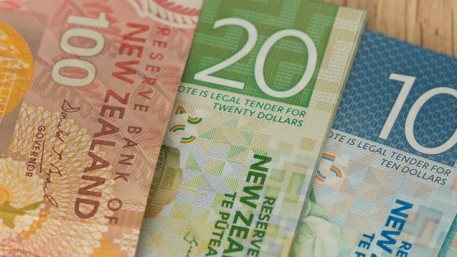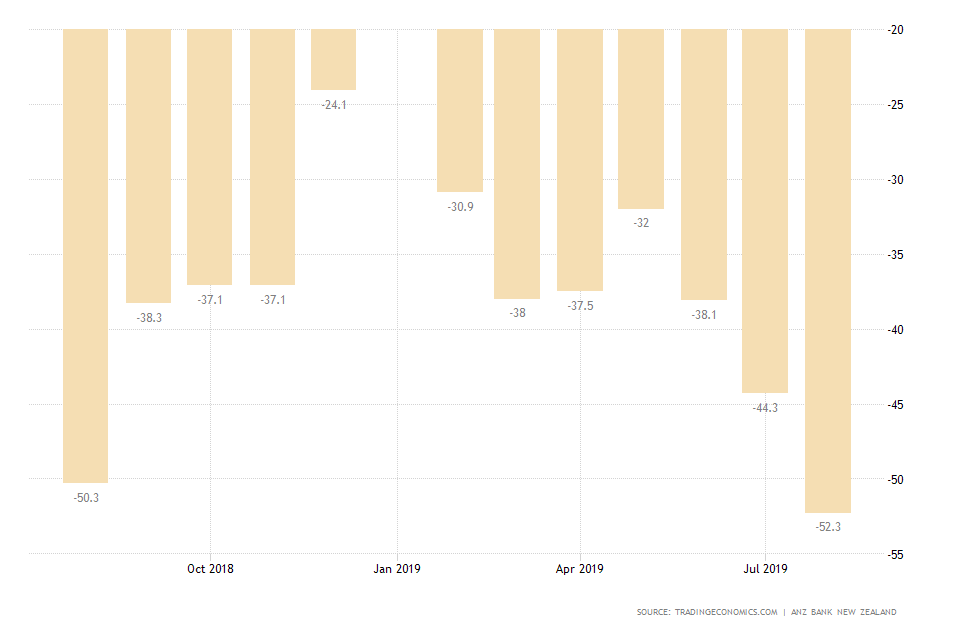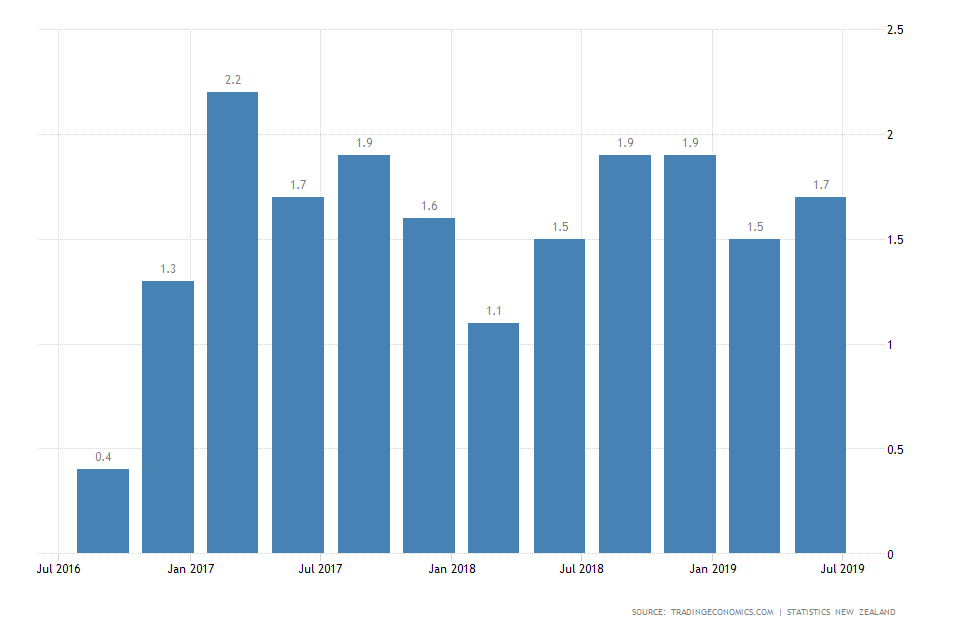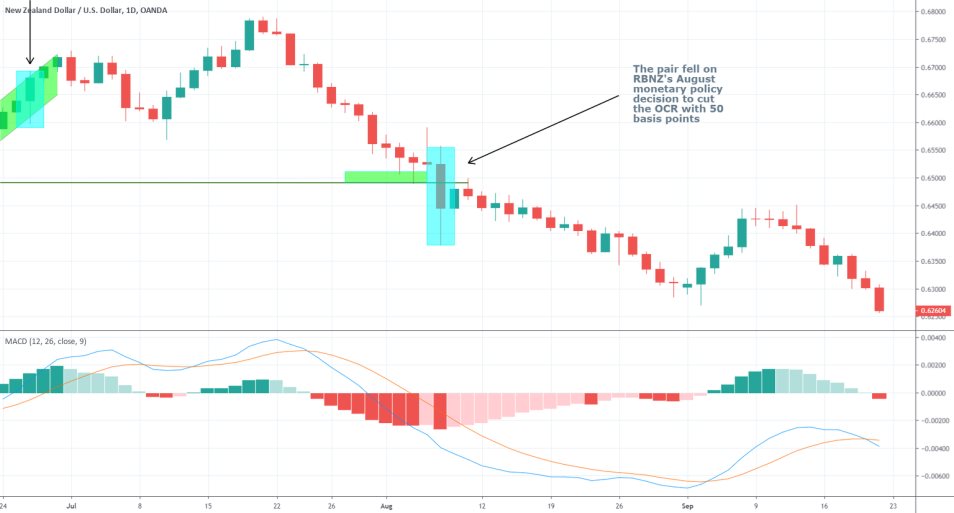
The Reserve Bank of New Zealand is the latest central bank that is going to deliberate on any potential changes to its monetary policy, later this week. The Monetary Policy Committee (MPC) of the RBNZ will gather early on Wednesday morning and the prevailing market forecasts do not project any drastic changes to the underlying late to be implemented at the current rate.
The interest rate was already reduced two times this year, the most recent reduction being during the MPC’s last meeting on the 7th of August when the rate was cut with 50 basis points from 1.50 per cent to its current level at 1.00 per cent. This was the single most significant cutback of the rate since March 2011, which in itself attests to the RBNZ's adamant stance on the necessity for a more accommodative approach towards monetary policy. It is precisely because the last reduction was so substantial in size, that economists and analysts expect the RBNZ to give more time to these changes in the structure of the monetary policy to influence the broader economy.
“In New Zealand, low interest rates and increased government spending will support a pick-up in demand over the coming year. Business investment is expected to rise given low interest rates and some ongoing capacity constraints. Increased construction activity also contributes to the pick-up in demand.” [source]
Meanwhile, Business Confidence has continued to deteriorate following the last monetary policy meeting, which indicates the need for more time of adjustments.

On the other hand, inflation has jumped to 1.7 per cent in the second quarter of 2019 from the previous level of 1.5, which demonstrates the improving price stability in the country. Regardless, the observed inflationary pressures continue to be below the RBNZ’s target level of 2 per cent, which signifies the spare capacity in the economy that still has to be utilized.

Overall, the downside risks to growth continue to strain the global economy and the prolonged disputes between the US and China maintain the condition of global trade uncertainty, so all of these factors are likely to weigh in on the ultimate decision of the RBNZ on Wednesday. The MPC is likely to comment on the development of the situation but is not expected to implement any drastic changes to the monetary policy at the current rate.
The NZDUSD has been struggling with mounting bearish pressure since the RBNZ cut the interest rate on the 7th of August, and the pair has been depreciating since then. Currently, the NZD/USD is trading at around 0.62600, which is a level that was last reached in September of 2015.

Trendsharks Premium
Gold is undergoing a correction, as investors take profits to offset losses from falling stock prices, impacting their margins. However, we anticipate a renewed wave of [...]
The Swiss stock market index is mirroring its global counterparts, such as Germany 40 and US100, experiencing a sharp decline following the announcement of new [...]
We’re analyzing the weekly chart to grasp the broader market trend. Over the past three years, the US30 index has surged by 17,000 points, often resembling a nearly straight [...]
Over the past week, the DAX has experienced a sharp decline, plunging by an astonishing 3,400 points. This downward movement is not isolated, as its international counterparts, such as the UK100 and US100, are also facing significant [...]
EURUSD recently formed a double top at 1.0930, signaling a potential trend reversal, and has since begun a correction. After a 600-pip rally since early March, a pullback at this stage is both expected and healthy. Given these conditions, we are placing a [...]
Since early March, EURJPY has surged nearly 1,000 pips, providing us with several excellent trading opportunities. However, as the rally matures, many early buyers are beginning to take profits, leading to a noticeable slowdown in the uptrend. On Friday, the pair formed a [...]
The AUDJPY currency pair continues to be dominated by bullish momentum, as multiple golden cross patterns reaffirm the strength of the ongoing uptrend. Despite this, we are witnessing a much-needed [...]
The EURAUD currency pair appears to be undergoing a trend reversal, signaling a potential shift in market direction. A notable technical development is the formation of a Death Cross on the chart, a widely recognized bearish indicator that typically suggests a [...]
After securing an impressive 200-pip profit last week, the EURJPY currency pair is now undergoing a southward correction, retracing some of its recent gains. Despite this temporary pullback, the Golden Cross remains intact, reinforcing our view that the overall trend continues to be [...]
The appearance of a Golden Cross in Silver strengthens our analysis that the metal is currently in a strong uptrend, indicating further bullish momentum in the market. This technical pattern, where the short-term moving average crosses above the [...]
This trade presents a considerable level of risk and can be classified as an opportunistic move based on recent price action. The GBPUSD currency pair has experienced a substantial bullish rally, surging by nearly 500 pips in a strong upward movement. However, after this extended period of appreciation, the pair is showing signs of a potential [...]
The anticipated Death Cross on the SMI20 appears to be failing as price finds strong support at the 23% Fibonacci retracement level. After testing this area, the index has shown bullish strength, printing several large green candles, signaling an increase in [...]
A Golden Cross has just appeared on the USDJPY chart, signaling a potential bullish move. This technical pattern occurs when the 20 period moving average crosses above the 60 period moving average, a widely recognized indication of increasing [...]
After 2 months of a down trend, we finally see some indications of price recovery for Oil. The golden cross, a historic buy signal, supports this [...]
For the past month, the German DAX40 has experienced a remarkable 10% surge, reflecting strong bullish momentum. Despite ongoing market volatility and frequent pullbacks, every dip continues to attract fresh buyers, reinforcing the [...]
Oil continues its downward trajectory, despite occasional pullbacks. The overall trend remains bearish, reinforced by multiple Death Cross patterns, a classic sell signal indicating further weakness. Adding to this bearish outlook, the critical [...]
Over the past few days, gold has experienced a sharp decline of more than $100. This downturn can be attributed in part to traders securing profits to manage their margins, which are under strain due to the significant drop in major indices. Currently, gold has fallen below the [...]
The NASDAQ 100 index is showing strong bullish momentum, as evidenced by the formation of a Golden Cross on the chart. This classic buy signal occurs when the short moving average crosses above the long term moving average, suggesting that upward momentum is [...]
The EURAUD currency pair has encountered a significant resistance level, failing to break above the critical 61% Fibonacci retracement level. This suggests that bullish momentum is weakening, reinforcing the case for a potential downward move. Given this technical setup, we favor entering a [...]
The UK100 is experiencing a remarkable rally! Over the past few weeks, the British stock market index has surged nearly 800 points. Each minor dip has attracted more buyers, fueling the bullish momentum. However, since last week, we’ve observed a slight [...]




















